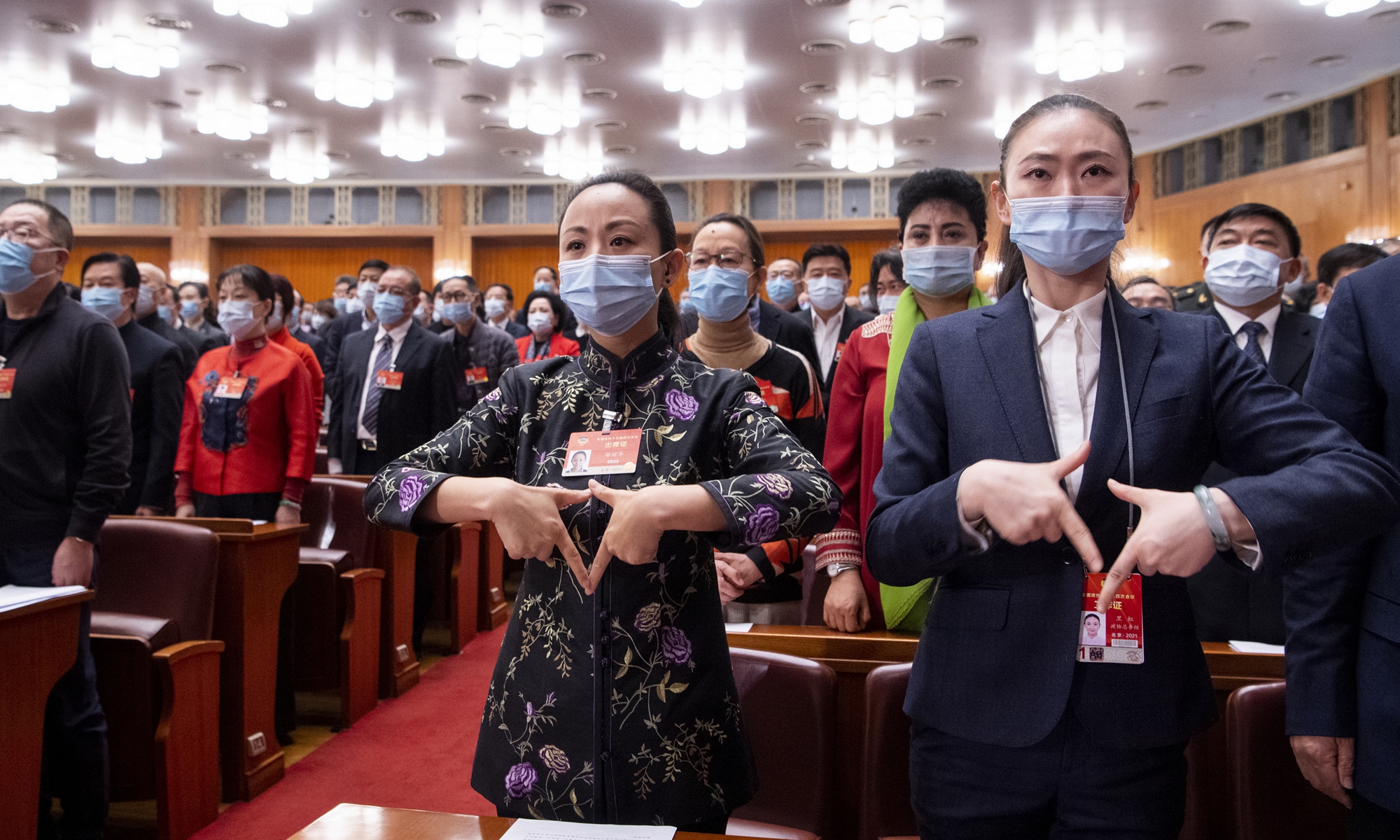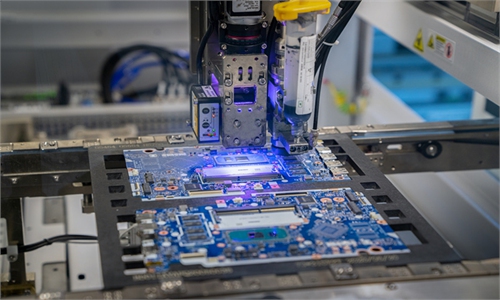
Tai Lihua (center), a member of the 13th National Committee of the Chinese People's Political Consultative Conference (CPPCC) and head of the China Disabled Persons' Art Troupe, and Hei Hong (right), sign language teacher and interpreter for the troupe, sign the national anthem on Wednesday when the fourth session of the 13th National Committee of the CPPCC closed at the Great Hall of the People in Beijing. Photo: VCG
Overlapping the Beijing 2022 Paralympic Winter Games where people with disabilities compete for honor, the two sessions also saw proposals from deputies and political advisors to enhance China's overall welfare for this group.
The more than 40 proposals cover the rehabilitation and long-term support for people with disabilities, education and employment of the group and their general integration into society, which demonstrate that "people-centered development will leave no one behind," observers said.
Many lawmakers focus on direct support and subsidies to people with disabilities, and Yu Minhong, a member of the Chinese People's Political Consultative Conference (CPPCC) National Committee, suggested economic support to people with disabilities to be distributed by household based on each household's realities.
Yu also suggested community-based shared care services for households having people with disabilities, so that other family members will be able to work and to enhance the family's economic situation.
Zhang Lili, a political advisor and vice president of the Jiamusi Disabled Persons Federation, called for systematic subsidies for assistive devices with central and local budgets.
Yang Jia, a CPPCC National Committee member with a visual disability, suggested promoting green printing in Braille, which is cheaper, more precise and lasts longer, to enhance bilingual printing, particularly for textbooks. Children with visual disabilities will be able to attend normal schools and enhance communications between the two groups.
The Global Times learned from the developing team that the technology allows Braille to be printed on different materials, including paper, glass and stainless steel, and can be printed along visual texts, facilitating everyday scenarios to be friendly for people with visual disabilities.
Yang had previously proposed admitting visual impaired students in the general college entrance examinations, which was later adopted.
Liu Qingfeng, a deputy to the National People's Congress (NPC) and board chairman of iFlytek, a leading Chinese AI firm specializing in speech recognition, proposed the accelerated building of a smart network that can help people with oral and hearing disabilities communicate. The quick development of 5G and Artificial Intelligence will assist such a network.
Liu's firm is currently developing devices for those groups under the support of the China Disabled Persons Federation. More than 1,000 teams are also using technologies open sourced by iFlytek to develop apps for those people.
Many deputies' and advisors' proposals are about applying the quickly developing internet platform to enhance the inclusiveness of schools and workplaces, enabling people with disabilities to better engage in social activities.
NPC deputy Wu Juan raised a proposal, calling for wider approval of driving licenses for people with disabilities, so that they can live better and even make a living on that. China allows people with certain limb disabilities to obtain a special kind of driving license.
With concrete proposals calling for better welfare for people with disabilities, with efforts of different departments and social sectors, China's para-welfare cause has made great progress.
The anti-poverty campaign has improved the economic situation of households with disabled members significantly. The integrated education was improved and literacy of disabled people above 15 years old was raised to 79 percent. The employment environment for people with disabilities was also improved, media reported.
Observers saw the two sessions, as well as China's overall efforts to enhance welfare for people with disabilities, as demonstrating "No one will be left behind in respecting and protecting human rights," which was emphasized in a latest white paper on China's para-sports and para-welfare development.
The success of the Winter Paralympics, which will conclude on Sunday, is seen as another epitome of such progress. More than 30 percent of performers at the Paralympics opening ceremony are people with disabilities.
Including the development of people with disabilities in its 14th Five-Year Plan (2021-25) and vision for 2035, China will continue on the track of firmly safeguarding their lawful rights and ensure that disabled people can enjoy social and economic progress equally, experts said.

